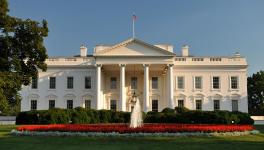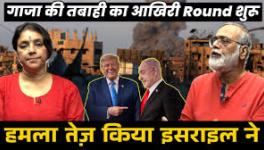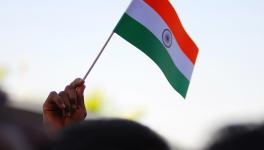Chinese Foreign Minister's Visit: No Reset of India China Relations
India's China relationship has soured after the initial bonhomie between Prime Minister Modi and President Xi Jingping on the banks of Sabarmati two years ago. On India's membership in the Nuclear Suppliers Group, it is not just China blocking India, as the Indian policy makers imply, but the fundamental contradiction of the NSG itself that needs to be resolved. NSG was an anti-India club, expressly created for preserving the Nuclear Non-Proliferation Treaty (NPT) order. India has yet to spell out how it currently views the NPT, to which it is not a signatory. Just as the NSG has to define – if it admits India – what it stands for.
In the last two years, India appears to have drifted closer to the US position on the containment of China. It has been critical of China on the South China Sea, and is reluctant to participate in China's One Road One Belt plans. India has also raised with Pakistan the “occupation” of Gilgit and Baltistan and supported Balochistan. All these are areas through which the Pakistan-China Economic corridor passes, ending at the Gwadar port in Balochistan. The Foreign Ministers cannot solve any of India-China outstanding issues, unless India agrees to have a different view of its larger economic relations with China. Continuing the Great Game that the British played in South Asia is an outmoded view of international relations and does not match the current global realities.
Rough Transcript
Prabir Purkayastha (Prabir): Hello and welcome to Newsclick, this program with The Real News. Today, we have with us Commander Atul Bhardwaj who is from the Institute of Chinese Studies. We are going to discuss, the Foreign Minister of China.Wang Yi's visit. Atul, this has been a visit which does not seem to have got much publicity. But do you regard it as a reset of India China's relationship considering the heat that was there generated on China apparently stopping Nuclear Suppliers Group membership and India's response on the South China sea
Atul Bhardwaj (Atul): Partly, his visit was not mainly for these reasons. He has come in here because his first stop if you see was in Goa. That is significant because Chinese President Xi Jinping is supposed to come to Goa in October for the BRICS summit. So he has come here basically to oversee the arrangements that are there, the administrative part of it. It is in the second half of his visit here that he came and met the Foreign Minister here (in Delhi) and other dignitaries including the Prime Minister. So in that sense, China is an important country and India has some issues with China, and they did discuss those issues.
Prabir: You know, it is interesting that the kind of warmth which we expect to see consequent to President Xi Jinping's visit in Ahmedabad where all this bonhomie took place on the banks of the river Sabarmati and so on got washed up so quickly. And after the Nuclear Suppliers Group deliberations India held China to be responsible. Then India's response on South China Sea accord and now the kind of issues implicitly based on the China- Pakistan (Economic) corridor. Do you think we are seeing the rise of tensions between India and China continuing?
Atul: Currently, one does not see any reset on the relationship. If you see the entire NSG issue, the entire blame has actually been put on China, as if China is the only country that has stalled all the progress of India into the NSG which is not a fact. h As already come out, most of the countries are opposed to it primarily because first of all India was not even discussed in that sense in the NSG meet that has happened.
Prabir: It was not on the original (NSG) agenda.
Atul: It was not on their original agenda actually. So this whole hype has been created even much before the NSG meet actually happened. There were reports which came out that China has agreed to support India and immediately after the meet there were reports that China has ditched India. So this whole atmospheric was created. Somehow there is some level of – I would say -- there is a reluctance on the part of India to get into a warm relationship with China. China at the moment does not see itself -- equates itself – with India. It sees India largely as a country which, the way it is operating with other countries, the way it is expanding itself with other countries, it sees India in that particular realm. It obviously wants India within its own orbit which it is creating now, which is very different from the American orbit. So it wants India in that particular orbit. India is acting a little rough of course.
Prabir: You know, I would like to discuss a little more on the Nuclear Suppliers Group issue because somewhere in the Indian discussions it is being forgotten that the Nuclear Suppliers Group was created against India. That India is not a signatory to Non-proliferation Treaty and therefore, we need to create a boundary within which India must be kept and therefore, should not be able to trade on nuclear goods. Partly, it was relaxed because of the Indo-US Nuclear Deal and what the Nuclear Suppliers Group agreed later. But even today, the Nuclear Suppliers Group's existence is (based) on the Non-proliferation Treaty. So question that has been raised not only by China but others as well is that how do you accommodate India and yet keep the Non-proliferation Treaty part of that?. This is one issue. Secondly, what is India's relation to the Non-proliferation Treaty? Does it accept it to be as an unequal treaty as it always held or say it is unequal but as long as we get space in the NSG, we are okay with this unequal treaty I think that's also not been spelled out.
Atul: Yes, that exactly has not been spelled out. India's stance actually has been ambiguous in this respect. You know on the one hand because of our civil- nuclear- military deal and our relationship with the United States, India thinks that it is somewhere near there to occupy a seat at the nuclear high table but that has not actually happened. There are, as you rightly said, problem is exactly of the NPT and that's what China has been saying.. China says that primarily it was the only issue that was discussed in the NSG meet; it was whether non NPT members can become apart of the whole game or not. Most of the countries are – since as you rightly said the very basis of NSG is NPT. So to change that particular law within the NSG, would require time.
Prabir: Coming back to the other issues which is one that also includes China is really India's issue with Pakistan. Now, India's relationship with Pakistan has soured again, the warmth which was shown by inviting Nawaz Sharif or Modi breaking his journey – what's called the Pappi Jhappi meeting – which he had with Prime Minister Nawaz Sharif. That warmth has also gone. Now, we are seeing a lot of tensions in the relations of India and Pakistan. Do you see this mention of Balochistan, Gilgit etc., as also part of the India's looking critically at China and Pakistan's economic corridor?
Atul: Firstly, I would like to say this entire foreign policy of the Modi administration has not been consistent. The inconsistencies in the foreign policy arenow coming to the fore you see, blow hot, blow cold. One day you decide to land in Pakistan, cut the cake with Nawaz Sharif, and the other day, you are doing something else. You take theissue of Balochistan itself. In 2009 when Manmohan Singh went to Sharm Al Sheikh and mentioned the word Balochistan in the joint statement with Pakistan, there was so much of hue and cry raised by the BJP on the entire issue. So much so that most of the government officials were also ready to distance themselves from this particular joint statement. It was said that we are basically admitting that we are interfering in Balochistan. Now, here is a Prime Minister who stood up on the ramparts of Red Fortand announced that he is the messiah of the Balochi rebels – as one would say. But this has longterm implications because this has actually just turned the Indian policy upside down. Till now, we have been maintaining -- our stance has been -- that we are different from Pakistan. Now, we are trying to equate ourselves with Pakistan. Our entire foreign policy has been to de-hyphenate ourselves from Pakistan. Now, with this, actually Modi has hyphenated us more and more. It has made us look much smaller on the global level.
Prabir: In international affairs you have rightly said this has made us look smaller, but I would say there is a consistency in Modi's foreign policy. It is predicated on the belief that if you act tough, everybody will fall on their knees and seek for forgiveness of some kind. The policy of this kind, which is based on bluff bluster, is the one which is failing. So he believes if he embraces and acts tough, then other countries like Pakistan, China will somehow accede to what India is saying. It is actually an ideological belief and that's what it is driving this foreign policy.
Atul: That has been the ideological belief and the people who are actually guiding the foreign policy in the Modi administration I think are not really seasoned diplomats. It's been guided more by frontier officers. During the British time you had these frontier officers and those who were really involved in border issues, and creating that entire Great Game and all that history.
Prabir: Intelligence apparatchiks.
Atul: Yes, they are guiding the foreign policy and they think that we are playing the fast chess. like Vishwanathan plays what you call that...
Prabir: Lightning chess.
Atul: Lightning chess game. You can't play that lighting chess game when you are not powerful. Pakistan doesn't listen to you because you are not that powerful. Powerful in the sense, economic power. You are not an economic power as yet, not that big economic power to make an impact outside your realm.
Prabir: China's GDP is five times that of ours.
Atul: China's GDP size, it's a reality. On the other hand if you see, there is a long term plan. The China Pakistan economic corridor which is being built goes along the Gilgit region right up to Gwadar and all that. That's Balochistan. Why is India opposed to it? The whole issue is, at the moment India is not in occupation – or India is not in possession – of that particular territory. All that is being built is an economic road or a railway line. Now we are opposing that particular line from Xinxiang, which will come through Gilgit. There is history to the whole thing. From Xinxiang we had fantastic relationships with India, before the British left or even till 1940s. There was trade which happened with Xinxiang which basically is a Muslim area, Muslim dominated area From there Muslims used to come to Ladakh, from Ladakh they used to go to Kashmir and from Kashmir they used to go to Bombay for their Haj. Or they used to go to Gilgit, Gilgit to Karachi and from Karachi they used to go by ship for their Haj. They used to bring lots of goods and there was a lot of trade happening. For example in 1920 itself there was 20 lakhs of trade which was happening. But then after the Russian revolution, the British raised, you know hyped this entire threat from Russia coming in, and then again to which communism was added. So this whole trade, they started curtailing this particular trade. If you see --because of that -- that was our basic link to entire Central Asia. The entire region could be conjoined in a fantastic manner like that. But now, beccause of Kashmir, it is all botched up. In fact, if we are to look at releasing the Kashmir problem, we need to think in terms of opening up (to Central Asia).
Prabir: So essentially, the Kashmir issue is getting linked to India, Pakistan, China issue as well which is of course the original problem. But the problem used to be India and Pakistan and now China is getting added to it because of the economic relations that is taking place particularly with Pakistan. A part of what you have discussed earlier that is this One Belt, One Road project that China has in which this Gwadar route is an important element.
Atul: This is an important element because here it brings basically that it is in India's interest. Why it is opposed to it I don't understand. It should actually allow some routes to go through it. If these routes are opened up, it opens up whole new vistas for trade with Central Asia, with Europe. Now, how it is in our interest to close these routes? It was in British interest or for that matter the Anglo Saxon interest to close these routes. When these routes were being closed, invariably after the Second World War or after 1948, Nehru and Sheikh Abdullah went right upto Ladakh to make sure that these routes are kept open. So the whole issue involved in it, is that the foreign policy needs to be imaginative. Needs to be rooted in history. It needs to see what is there in India's interest.
Prabir: Thank you very much for being with us.
Get the latest reports & analysis with people's perspective on Protests, movements & deep analytical videos, discussions of the current affairs in your Telegram app. Subscribe to NewsClick's Telegram channel & get Real-Time updates on stories, as they get published on our website.
























